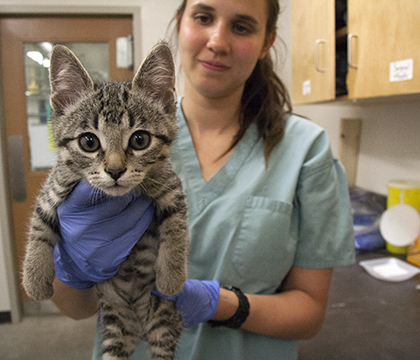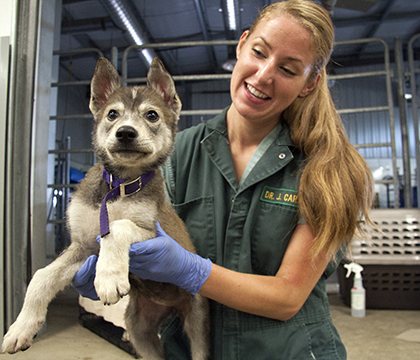The thought of those stranded animals and their owners' anxiety motivated many people and organizations from across the province to respond — including the Western College of Veterinary Medicine (WCVM).
When news came that the Northern Animal Rescue Humane Society (NAR) and the Prince Albert SPCA were transporting many of the northern pets out of the fire-threatened communities, the veterinary college made some calls to those groups and set up its own emergency response team.
"Helping out during this time of crisis for so many families and their pets is just the right thing to do," says WCVM Dean Dr. Douglas Freeman. "We have the people, resources and clinical expertise to help our northern partners, so we want to do what we can to assist them with their efforts."
In less than 24 hours, the WCVM set up a temporary shelter in one of the college's teaching buildings to house some of the pets once the Prince Albert SPCA facilities were full.
"People from the college and the local community pitched in to help in all sorts of ways — it's been amazing to see what we were able to accomplish in such a short time," says Freeman.
For example, staff at the college's animal care unit (ACU) found extra dog runs so the pets could have some safe space. When the ACU's supplier — Nordic Fencing — heard about the WCVM's efforts, the local company promptly lent 20 additional dog runs to the college for its temporary shelter.
Since July 8, the WCVM has housed and treated 78 animals including 66 dogs and 12 cats. The majority of these animals are owned. The team has worked with WCVM students and employees, the local veterinary community and Saskatoon's New Hope Dog Rescue to find temporary foster placements for 36 of these animals – including three moms with litters of young puppies.
"Knowing that we're alleviating that extra concern for people who are already extremely stressed with the unknown is what makes it worthwhile," says Dr. Karen Sheehan, wellness veterinarian at the WCVM Veterinary Medical Centre.
For Sheehan, some of the northern pet owners are already familiar to her. Throughout the year, she's in regular contact with northern residents and NAR to set up remote spay-neuter clinics as part of the college's service learning program for senior veterinary students.
Those experiences have helped her and others at WCVM understand the connections that northerners have with their animals. In the past few days, Sheehan's northern contacts have also helped her get in touch with several residents whose pets are in the WCVM's care so she could let them know that their animals were safe.
One particular phone call led to a happy reunion between a northern dog and his owner who was able to take his pet home this week.
In the college's temporary shelter, four recent WCVM veterinary graduates and a revolving group of volunteers are working to provide constant care for the 31 dogs and three cats that still need temporary foster homes.
Lunch hour at the shelter doesn't mean break time. Instead there's a list of jobs to do: water the dogs, wash food bowls, walk dogs, and most importantly, cuddles.

Volunteers arrive and get straight to work after donning scrubs. Sheehan runs over care plans with the staff. Veterinarian Dr. Christie Braaten helps with paperwork for a volunteer who has just arrived to pick up a foster dog. Above all the human commotion is the constant din of dogs barking.
While it sounds chaotic, a feeling of calm prevails. After more than a week of operating the temporary shelter, the four veterinarians in charge have things running smoothly. There's a set schedule, and more than 50 volunteers from the Saskatoon area's animal health community have signed up to help.
"They're amazing," says Braaten of the volunteers who come in to feed, walk and clean up after the animals.
"The volunteers are our lifeline. We couldn't do this without them," says Dr. Diti Antonopoulos, another recent WCVM graduate who is working at the shelter.
She says northern residents can be assured that their animals are receiving excellent care from the team of clinicians and volunteers.
"Every dog here has a name. Every dog has a personality. We've really come to know our animals. It's a little community," says Antonopoulos. "This has been a provincial crisis, and this is a way we can help in the littlest way."
Sheehan says the WCVM has been overwhelmed by the number of people, companies and organizations that have offered to help. In turn, people at the college continue to think of ways to help northern pets. For example, the Veterinary Medical Centre's social committee organized a barbecue on July 10 and raised more than $2,200 for Northern Animal Rescue in a few hours.
While the local animal health community is providing enough volunteers for the temporary shelter's activities, the WCVM team's top priority is finding foster placements for each of the dogs still in the shelter. Members of the public who wish to help can contact New Hope Dog Rescue (karenm@newhoperescue.org) to complete the temporary foster home application process.
The WCVM Veterinary Medical Centre's Small Animal Clinic reception is a designated drop-off site for donations of pet food, bedding and other supplies. The college is also accepting donations to pay for the costs of treating some pets that are in need of additional medical care. For more information, contact the WCVM's Development Office (jennifer.molloy@usask.ca; 306-966-7450).
Once residents can safely return to their homes in La Ronge and other northern communities, the WCVM will continue working with NAR and the Prince Albert SPCA to reunite people with their pets.
"We just want a happy ending for everybody," says Braaten.
When news came that the Northern Animal Rescue Humane Society (NAR) and the Prince Albert SPCA were transporting many of the northern pets out of the fire-threatened communities, the veterinary college made some calls to those groups and set up its own emergency response team.
"Helping out during this time of crisis for so many families and their pets is just the right thing to do," says WCVM Dean Dr. Douglas Freeman. "We have the people, resources and clinical expertise to help our northern partners, so we want to do what we can to assist them with their efforts."
In less than 24 hours, the WCVM set up a temporary shelter in one of the college's teaching buildings to house some of the pets once the Prince Albert SPCA facilities were full.
"People from the college and the local community pitched in to help in all sorts of ways — it's been amazing to see what we were able to accomplish in such a short time," says Freeman.
For example, staff at the college's animal care unit (ACU) found extra dog runs so the pets could have some safe space. When the ACU's supplier — Nordic Fencing — heard about the WCVM's efforts, the local company promptly lent 20 additional dog runs to the college for its temporary shelter.
Since July 8, the WCVM has housed and treated 78 animals including 66 dogs and 12 cats. The majority of these animals are owned. The team has worked with WCVM students and employees, the local veterinary community and Saskatoon's New Hope Dog Rescue to find temporary foster placements for 36 of these animals – including three moms with litters of young puppies.
"Knowing that we're alleviating that extra concern for people who are already extremely stressed with the unknown is what makes it worthwhile," says Dr. Karen Sheehan, wellness veterinarian at the WCVM Veterinary Medical Centre.
For Sheehan, some of the northern pet owners are already familiar to her. Throughout the year, she's in regular contact with northern residents and NAR to set up remote spay-neuter clinics as part of the college's service learning program for senior veterinary students.
Those experiences have helped her and others at WCVM understand the connections that northerners have with their animals. In the past few days, Sheehan's northern contacts have also helped her get in touch with several residents whose pets are in the WCVM's care so she could let them know that their animals were safe.
One particular phone call led to a happy reunion between a northern dog and his owner who was able to take his pet home this week.
In the college's temporary shelter, four recent WCVM veterinary graduates and a revolving group of volunteers are working to provide constant care for the 31 dogs and three cats that still need temporary foster homes.
Lunch hour at the shelter doesn't mean break time. Instead there's a list of jobs to do: water the dogs, wash food bowls, walk dogs, and most importantly, cuddles.

Volunteers arrive and get straight to work after donning scrubs. Sheehan runs over care plans with the staff. Veterinarian Dr. Christie Braaten helps with paperwork for a volunteer who has just arrived to pick up a foster dog. Above all the human commotion is the constant din of dogs barking.
While it sounds chaotic, a feeling of calm prevails. After more than a week of operating the temporary shelter, the four veterinarians in charge have things running smoothly. There's a set schedule, and more than 50 volunteers from the Saskatoon area's animal health community have signed up to help.
"They're amazing," says Braaten of the volunteers who come in to feed, walk and clean up after the animals.
"The volunteers are our lifeline. We couldn't do this without them," says Dr. Diti Antonopoulos, another recent WCVM graduate who is working at the shelter.
She says northern residents can be assured that their animals are receiving excellent care from the team of clinicians and volunteers.
"Every dog here has a name. Every dog has a personality. We've really come to know our animals. It's a little community," says Antonopoulos. "This has been a provincial crisis, and this is a way we can help in the littlest way."
Sheehan says the WCVM has been overwhelmed by the number of people, companies and organizations that have offered to help. In turn, people at the college continue to think of ways to help northern pets. For example, the Veterinary Medical Centre's social committee organized a barbecue on July 10 and raised more than $2,200 for Northern Animal Rescue in a few hours.
While the local animal health community is providing enough volunteers for the temporary shelter's activities, the WCVM team's top priority is finding foster placements for each of the dogs still in the shelter. Members of the public who wish to help can contact New Hope Dog Rescue (karenm@newhoperescue.org) to complete the temporary foster home application process.
The WCVM Veterinary Medical Centre's Small Animal Clinic reception is a designated drop-off site for donations of pet food, bedding and other supplies. The college is also accepting donations to pay for the costs of treating some pets that are in need of additional medical care. For more information, contact the WCVM's Development Office (jennifer.molloy@usask.ca; 306-966-7450).
Once residents can safely return to their homes in La Ronge and other northern communities, the WCVM will continue working with NAR and the Prince Albert SPCA to reunite people with their pets.
"We just want a happy ending for everybody," says Braaten.
Share this story
